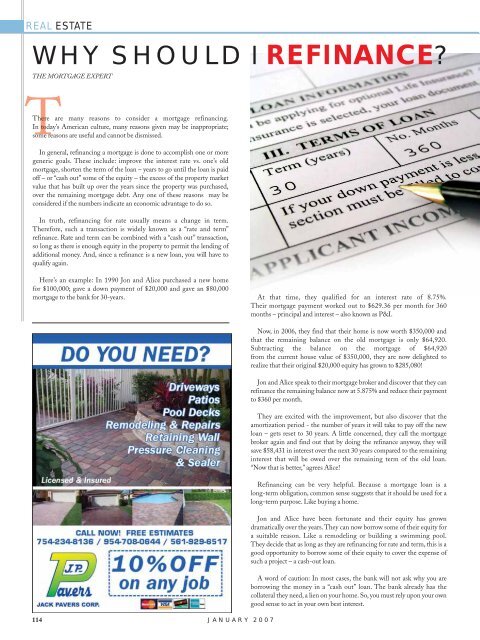Have a Happy & Healthy New Year! - the Parklander
Have a Happy & Healthy New Year! - the Parklander
Have a Happy & Healthy New Year! - the Parklander
You also want an ePaper? Increase the reach of your titles
YUMPU automatically turns print PDFs into web optimized ePapers that Google loves.
REAL ESTATE<br />
WHY SHOULD I REFINANCE?<br />
THE MORTGAGE EXPERT<br />
There are many reasons to consider a mortgage refinancing.<br />
In today’s American culture, many reasons given may be inappropriate;<br />
some reasons are useful and cannot be dismissed.<br />
In general, refinancing a mortgage is done to accomplish one or more<br />
generic goals. These include: improve <strong>the</strong> interest rate vs. one’s old<br />
mortgage, shorten <strong>the</strong> term of <strong>the</strong> loan – years to go until <strong>the</strong> loan is paid<br />
off – or “cash out” some of <strong>the</strong> equity – <strong>the</strong> excess of <strong>the</strong> property market<br />
value that has built up over <strong>the</strong> years since <strong>the</strong> property was purchased,<br />
over <strong>the</strong> remaining mortgage debt. Any one of <strong>the</strong>se reasons may be<br />
considered if <strong>the</strong> numbers indicate an economic advantage to do so.<br />
In truth, refinancing for rate usually means a change in term.<br />
Therefore, such a transaction is widely known as a “rate and term”<br />
refinance. Rate and term can be combined with a “cash out” transaction,<br />
so long as <strong>the</strong>re is enough equity in <strong>the</strong> property to permit <strong>the</strong> lending of<br />
additional money. And, since a refinance is a new loan, you will have to<br />
qualify again.<br />
Here’s an example: In 1990 Jon and Alice purchased a new home<br />
for $100,000; gave a down payment of $20,000 and gave an $80,000<br />
mortgage to <strong>the</strong> bank for 30-years.<br />
114 JANUARY 2007<br />
At that time, <strong>the</strong>y qualified for an interest rate of 8.75%.<br />
Their mortgage payment worked out to $629.36 per month for 360<br />
months – principal and interest – also known as P&I.<br />
Now, in 2006, <strong>the</strong>y find that <strong>the</strong>ir home is now worth $350,000 and<br />
that <strong>the</strong> remaining balance on <strong>the</strong> old mortgage is only $64,920.<br />
Subtracting <strong>the</strong> balance on <strong>the</strong> mortgage of $64,920<br />
from <strong>the</strong> current house value of $350,000, <strong>the</strong>y are now delighted to<br />
realize that <strong>the</strong>ir original $20,000 equity has grown to $285,080!<br />
Jon and Alice speak to <strong>the</strong>ir mortgage broker and discover that <strong>the</strong>y can<br />
refinance <strong>the</strong> remaining balance now at 5.875% and reduce <strong>the</strong>ir payment<br />
to $360 per month.<br />
They are excited with <strong>the</strong> improvement, but also discover that <strong>the</strong><br />
amortization period - <strong>the</strong> number of years it will take to pay off <strong>the</strong> new<br />
loan – gets reset to 30 years. A little concerned, <strong>the</strong>y call <strong>the</strong> mortgage<br />
broker again and find out that by doing <strong>the</strong> refinance anyway, <strong>the</strong>y will<br />
save $58,431 in interest over <strong>the</strong> next 30 years compared to <strong>the</strong> remaining<br />
interest that will be owed over <strong>the</strong> remaining term of <strong>the</strong> old loan.<br />
“Now that is better,” agrees Alice!<br />
Refinancing can be very helpful. Because a mortgage loan is a<br />
long-term obligation, common sense suggests that it should be used for a<br />
long-term purpose. Like buying a home.<br />
Jon and Alice have been fortunate and <strong>the</strong>ir equity has grown<br />
dramatically over <strong>the</strong> years. They can now borrow some of <strong>the</strong>ir equity for<br />
a suitable reason. Like a remodeling or building a swimming pool.<br />
They decide that as long as <strong>the</strong>y are refinancing for rate and term, this is a<br />
good opportunity to borrow some of <strong>the</strong>ir equity to cover <strong>the</strong> expense of<br />
such a project – a cash-out loan.<br />
A word of caution: In most cases, <strong>the</strong> bank will not ask why you are<br />
borrowing <strong>the</strong> money in a “cash out” loan. The bank already has <strong>the</strong><br />
collateral <strong>the</strong>y need, a lien on your home. So, you must rely upon your own<br />
good sense to act in your own best interest.

















